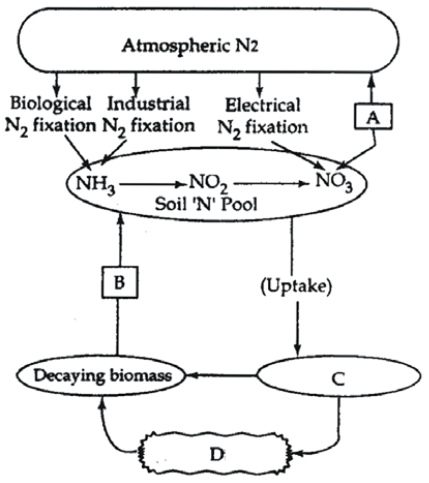 Multiple Choice Questions
Multiple Choice QuestionsThe Indian rhinoceros is a natural inhabitant of which one of the Indian states?
Uttarakhand
Uttar Pradesh
Himachal Pradesh
Himachal Pradesh
Which one of the following types of organisms occupy more than one trophic level in a pond ecosystem?
Phytoplankton
Fish
Zoonplankton
Zoonplankton
DDT residues are rapidly passed through food chain causing biomagnification because DDT is
liposoluble
moderately toxic
non-toxic to aquatic animals
non-toxic to aquatic animals
Study the cycle shown below and select the option which gives correct words for all the four blanks A, B, C and D.
|
A |
B |
C |
D |
|
Nitrification |
Ammonification |
Animals |
plants |
|
A |
B |
C |
D |
|
Dentirificiation |
Ammonification |
Plants |
Animals |
|
A |
B |
C |
D |
|
Nitrification |
Denitrification |
Animals |
Plants |
|
A |
B |
C |
D |
|
Nitrification |
Denitrification |
Animals |
Plants |
Which one of the following is being tried in India as a biofuel substitute for fossil fuels
Jatropha
Azadirachta
Musa
Musa
Which one of the following is not used for construction of ecological pyramids?
Dry weight
Number of individuals
Rate of energy flow
Rate of energy flow
D.
Rate of energy flow
Ecological pyramids are the graphical representation of the trophic structure and function at successive trophic levels. Ecological pyramids are of three general types, listed as here under:
(i) Pyramid of numbers, showing the number of organisms at each level.
(ii) Pyramid of biomass, showing the total dry weight of living matter.
(iii) Pyramid of energy, showing the rate of energy flow/productivity at successive trophic levels.
Thus, fresh weight is not used for the construction of ecological pyramids.
Treatment of seed at low temperature under moist conditions to break its dormancy is called
scarification
vernalization
chelation
chelation
Which ecosystem has the maximum biomass?
Forest ecosystem
Grassland ecosystem
Pond ecosystem
Pond ecosystem
Presence of plants arranged into well defined vertical layers depending on their height can be seen best in :
Tropical Savannah
Tropical Rain Forest
Grassland
Grassland
Match the items given in Column I with those in Column II and select the correct option given below :
| Column I | Column II | ||
| a | Eutrophication | i | UV-B radiation |
| b | Sanitary landfill | ii | Deforestation |
| c | Snow blindness | iii | Nutrient enrichment |
| d | Jhum cultivation | iv | Waste disposal |
| a | b | c | d |
| ii | i | iii | iv |
| a | b | c | d |
| i | iii | iv | ii |
| a | b | c | d |
| i | ii | iv | iii |
| a | b | c | d |
| iii | iv | i | ii |
